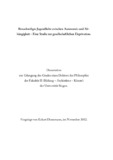Zitierlink:
https://nbn-resolving.org/urn:nbn:de:hbz:467-7399Dateien zu dieser Ressource:
| Datei | Beschreibung | Größe | Format | |
|---|---|---|---|---|
| diezemann.pdf | 2.2 MB | Adobe PDF |  Öffnen/Anzeigen |
| Dokumentart: | Doctoral Thesis | Titel: | Benachteiligte Jugendliche zwischen Autonomie und Abhängigkeit : eine Studie zur gesellschaftlichen Deprivation | Sonstiger Titel: | Disadvantaged youth between obedience and autonomy : a study of social deprivation | AutorInn(en): | Diezemann, Eckart | Institut: | Fakultät II (Bildung, Architektur, Künste) | Schlagwörter: | Benachteiligte, Deprivation, Sozialcharakter, Subjektkonstitution, disadvantaged youth, subject constitution, deprivation, social character | DDC-Sachgruppe: | 360 Soziale Probleme, Sozialdienste, Versicherungen | GHBS-Notation: | IBA IKY ODB OHT |
Erscheinungsjahr: | 2012 | Publikationsjahr: | 2013 | Zusammenfassung: | Der Diskurs über Benachteiligte offenbart einen Widerspruch zwischen formalen Normen und ihrer materialen Realisierung. Einerseits ist - dem ethisch-demokratischen Postulat von Zivilgesellschaft folgend - über die Codierungen des Sozialgesetzbuchs gesellschaftliche Teilnahme intendiert; es besteht also ein gesellschaftliches Versprechen auf gelingende Subjektkonstitution über den Ausbildungs- und Arbeitsmarkt. Andererseits gelingt der nationalen Bildungsberichterstattung zu Folge jährlich einem erheblichen Teil der Kohorte an Schulabgängern die Aufnahme eines Aus- bzw. Arbeitsverhältnisses nicht, und es fehlt gleichzeitig an gesellschaftlich adäquaten Institutionen, um das Versprechen auf Teilhabe faktisch werden zu lassen. Umso befremdlicher wirken verstärkt auftretende Klagen über (zukünftig) fehlende Facharbeiterbedarfe. Geht man davon aus, dass die Klärung der Subjektkonstitution der zentrale Gegenstandsbereich der Bildungsforschung ist, dann zeigt sich im Diskurs über Benachteiligte zwar noch eine marginale Beschäftigung mit Fragen der Subjektkonstitution. Der Zusammenhang von gesellschaftlichen Widerspruchslagen und Subjektkonstitution gehört indes nicht mehr zum Gegenstand erziehungswissenschaftlicher Untersuchungen, wenn es um benachteiligte Jugendliche geht. Demgegenüber herrschen eher Erklärungsversuche vor, welche die Subjektkonstitution auf Migrationshintergründe, sozio-kulturelle Herkunft oder Schulerfolg beschränken. Für die Planung, Steuerung und Regulation von Bildungsprozessen reicht das so generierte Wissen allerdings nicht aus, weil es die Ebenen der Vermittlung des Subjektes mit der Welt, also die Produktions- und Reproduktionsverhältnisse von Individuum und Gesellschaft nicht erhellt und somit nicht zur Klärung von Fragen der Subjektkonstitution beitragen kann. Gegenstand der wissenschaftlichen Untersuchung im Rahmen der vorliegenden Arbeit ist deshalb der Versuch, von der regulativen Leitidee der Konfiguration bzw. Kopplung der Prozesse von Sozio- und Psychogenese (vgl. Elias) ausgehend danach zu fragen, wie gesellschaftliche Bestimmungen und Sozialcharaktere die Subjektkonstitution beeinflussen. The scientific discourse about disadvantaged youth reveals a contradiction between formal norms and their realization. On the one hand, the judicial codification within the German Code of Social Law - following the democratic-ethical posit of civil society –aims for social inclusion which must be interpreted as a social promise of successful constitution of the human subject via the market of vocational training and the employment market itself. On the other hand, annual reports on the state of education in Germany reveal that there is a significant number of graduates who are excluded from the market of vocational training. At the same time there is a lack of adequate institutions, which consequently prevents/inhibits the realization of social inclusion of the aforementioned. A fortiori claims about the (potentially) uncovered demand of skilled workers in the future must surprise. Acting on the assumption that elucidation of the constitution of the human subject is the core universe of discourse in educational research, the scientific discourse on disadvantaged youth only marginally deals with the constitution of the human subject. The relation between social contradictions, the implicit social orders to cope and the constitution of the human subject however are not subject to educational science in the context of research on disadvantaged youth. In contrast, social exclusion of disadvantaged youth is attempted to be explained by monocausally having recourse on migration background, socio-cultural heritage or success in school. The knowledge that is being generated in this way is insufficient concerning processes of educational planning and regulation because it does not help to elucidate the levels of intermediation between the human subject and the world, namely the relations of production and reproduction of person and society and thus it does not contribute to elucidate questions of subject constitution. Therefore the object of this scientific investigation of this study - emanating from Elias' concept about the interconnection of sociogenesis and psychogenesis - to elucidate the impact of social dispositions and rationalities and social characters on the constitution of the human subject. |
URN: | urn:nbn:de:hbz:467-7399 | URI: | https://dspace.ub.uni-siegen.de/handle/ubsi/739 | Lizenz: | https://dspace.ub.uni-siegen.de/static/license.txt |
| Enthalten in den Sammlungen: | Hochschulschriften |
Diese Ressource ist urheberrechtlich geschützt. |
Seitenansichten
1.253
checked on 27.12.2024
Download(s)
1.354
checked on 27.12.2024
Google ScholarTM
Prüfe
Alle Ressourcen in diesem Repository sind urheberrechtlich geschützt, soweit nicht anderweitig angezeigt.

